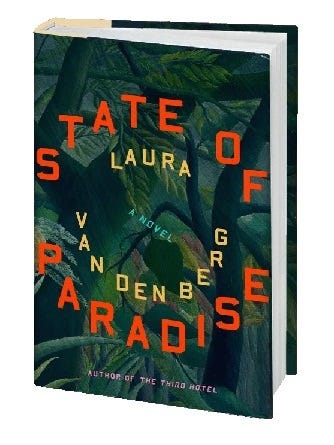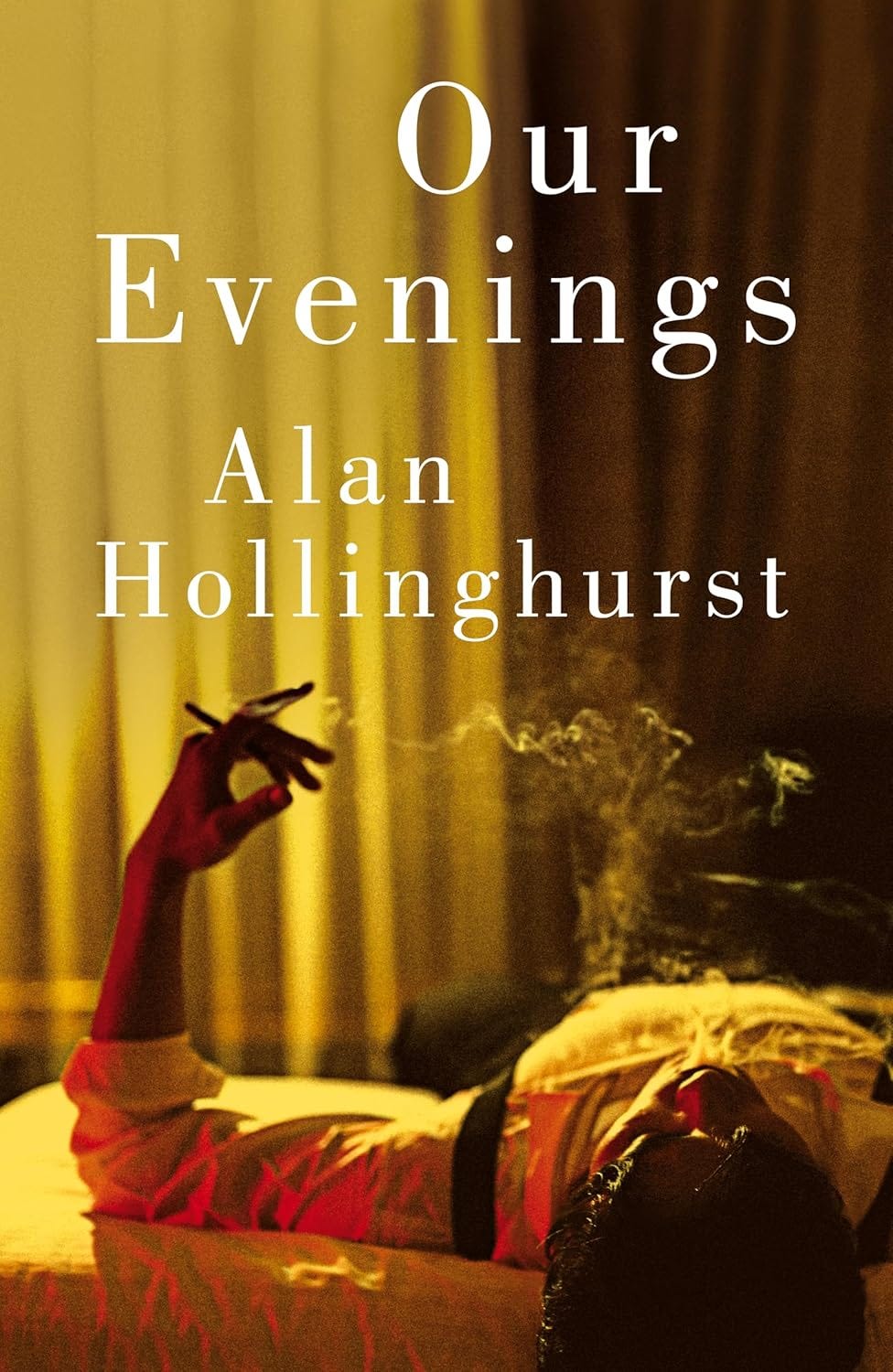'Having a bad sentence in front of her makes her “ill”—I feel pretty much the same': Laura van den Berg answers our new questions on prose style
Plus our next pick from the recent releases in literary fiction
Auraist went live on Substack a year ago. At that point we’d no clear idea how our focus on prose style would go down, as we’d no similar projects to measure ourselves against. The hope was that we’d end our first year with maybe a few hundred people having shown some interest.
So to the twenty-one thousand of you who’ve signed on to follow or subscribe to our picks and masterclasses: thank you. Your support has been extraordinary.
And thanks too to the writers, publishers, editors, and publicists who right from the start way exceeded our expectations of industry support.
The plan for the next year is to print-publish a collection of our author masterclasses, and to publish here book reviews that focus on style, and essays that explore more deeply the issues raised in those masterclasses. And, don’t you worry, we’ll get back to the lack of valid justifications for the existence of the self.
We’ll also extend our search for the best stylists to include more Substackers and indie writers. Two of the best, Eleanor Anstruther and Samuél Lopez-Barrantes, will be joining me on the 16th of November for a live video discussion of what we mean by the term ‘literary’. All of you are welcome to join us, and you can find more info here.
To celebrate our birthday, for today we’re offering paid subscriptions for the next year for free (as time goes on, we’ll be restricting more features to our paid subscribers).
IN TODAY’S ISSUE
—‘having a bad sentence in front of her makes her “ill”—I feel pretty much the same’: Laura van den Berg answers our new set of questions on prose style. In August we picked her State of Paradise as one of the best-written recent releases in literary fiction. You can read an extract here.
—’I looked again in the mirror, at the two old men in bed. Now Mum’s gone, and Mark’s gone, and here we are, with Giles all over the papers, all over the country, tearing up our future and our hopes’: our next pick from the recent releases in literary fiction. Our previous picks are here and here, along with the list of books considered.
If you’d like us to consider your own recent release or a work you’ve serialised on Substack, sign up for a paid subscription via the button below and email a copy of your book to auraist@substack.com. If we pick your submission we’ll invite you to write an article on prose style that will be included in the published collection of these pieces.
Any thoughts related to our picks and masterclasses, or prose style generally? Email them to the above address and we’ll give you a complimentary six-month paid subscription. We also offer this subscription to Substackers who recommend or restack Auraist.
LAURA VAN DEN BERG ON PROSE STYLE
What stylistic issues were most important to the writing of State of Paradise?
The novel grew out of a diaristic project I began when I unexpectedly moved home, to Florida, in 2020—I wanted to retain some of that intimacy, that feeling of a character thinking aloud on the page, of a voice calling out to whoever is still around to listen. I was also very concerned with describing Florida with vividness and precision.
Were there writers whose sentences permanently affected the standards of your reading and your own writing aspirations? Has your tolerance for less polished prose decreased over time?
One of the very first short stories I fell in love with was “In the Cemetery Where Al Jolson Was Buried” by Amy Hempel—every sentence feels like a little jolt of electricity. In an interview, Hempel once said that having a bad sentence in front of her makes her “ill”—I feel pretty much the same.
Audiences avoid music or cinema with amateurish or dated production values. So why is inept or dated technique often welcome in published prose? Why do reviewers, interviewers, and creative writing teachers pay so little attention to style?
I teach creative writing and actually spend a lot of time talking about style—identifying good sentences and exploring what makes them interesting, daring, memorable. And helping students to see flickers of style taking shape in their own work, like signals from their future selves. I’d love to see more close reading in book reviews—this is where my favorite critics shine. I’m not tech-adverse, but I do think the shrinking attention span is a real thing in our current moment; so many of us are so used to multitasking, thanks to all our devices, that it’s getting harder and harder to really sink in to a paragraph.
In a recent podcast, Substack’s senior staff discussed the consumption of well-written books chiefly as a form of social posturing, and wondered how they might facilitate this in Substack’s design. Are prose snobs just plain old snobs?
Snobbery implies a kind of narrowness, a belief that only this kind of sentence can be a good one. It’s a very limited view of the world, and of writing. The beauty of good sentences is that they come in many different shapes. A good sentence is a collaboration between the words themselves and the context they exist in.
A writer pitched to us a piece arguing against Auraist’s emphasis on accomplished sentences. What truly mattered in writing, he believed, was daring plotlines and ideas. We admired his cheek and said we’d publish his findings, if the piece was well-written. We never heard back from him. Do theorists from this school ever corner you at parties?
Ha, yes—I have gotten variations on this question. If the plot is gripping enough can you forgive the bad writing? This implies that it’s an either / or—that you can have the gripping plot or the good writing. Which is of course absurd. I love Tana French, for example, for her gripping plots and her atmospheric evocative prose. She’s a wonderful writer of landscape, mood.
Some famously weak stylists believe their work deserves more respect. Why don’t they just pay some dirt-poor style-obsessive 1% of their advances to edit their books into shape?
Mercifully, I’m not in the business of sorting out how publishing should work—though I do often find myself wishing it would work better!
Many readers who no longer buy novels cite their inability to fully immerse themselves in fiction, to suspend their disbelief. How important are voice and style to casting the fictional spell that helps such immersion?
Incredibly. When a fictional voice—and everything in fiction is made of sentences—is really compelling it can feel very much like falling under a spell. Getting swept out to sea. I live for that feeling as a reader.
When this immersion fails, and/or a writer’s sentences are botched, fiction can indeed become, in Rachel Cusk’s phrase, ‘fake and embarrassing’, as feeble acting exposes a drama’s fakeness. How important are voice and style to gaining the reader’s trust that your book’s worth committing hours to?
When I’m starting a book, and hoping to fall under that spell, and then there’s a break in the rhythm of the prose, when a sloppy or flat sentence all of a sudden makes an appearance—it’s like nails going down a chalkboard. It doesn’t always mean the book has totally lost me for good, but it’s making it harder for me to go under. To trust in the spell.
Do you ever find yourself agreeing with readers or writers dubious about style? How would you answer doubts linked to the slick linguistic style of marketing and propaganda?
Are readers dubious about style? That’s not really been my experience. I would say not all readers value style which is their prerogative. The marketing and propaganda is more worrisome. And, to connect the two thoughts, maybe it’s not so much a skepticism about style than the culture training us so very well in a particular kind of style—simple stories, clear stories, stories that are pressing an agenda. Stories are all around us and they are very powerful—and that power can be wielded in the service of revealing truth, or in the service of obfuscating it.
Do you have any stylistic tips that for Auraist’s readers?
Yes! In early drafts, I’m very intuitive I don’t think strategically at all about, say, sentence length or syntax. I am just turning the radio dial, trying to find a particular frequency—and when I land on the right frequency I just know. It’s something I feel in my body. An energetic infusion. In later drafts, I start looking at the lines more carefully. I usually retype all my drafts at least a few times, and I also find reading aloud to be illuminating. That’s when I can really experience the rhythms, the syntax, the energy. And then I get to work on shaping that energy.
Any tips specific to literary fiction?
Not every sentence needs to be a showstopper. Sometimes writers early in their practice feel this pressure to make every sentence virtuosic, which can feel like an overload of something really potent. Too much truffle oil!
My other great love is boxing—which, at the highest level, is very much a sport of style. The great fighters often have a specific style, a style that they have spent countless hours honing, but also the framework of that style can house a lot of different kinds of gears and movements. A fighter known for blinding power, for example, is not going to throw every single shot like Zeus hurling a lightning bolt. And sometimes you just have to meet the moment—which is to say that different projects might well require different styles, or at least versions on a style.
Books not picked for Auraist tend to lack appealing rhythms, and musicality more generally. Can musicality be taught? Do you have to work on this in your own sentences or does it come naturally?
Both, I think—I work on my lines a lot, especially in the later stages. I don’t know if musicality can be taught, but I do think it can be honed, cultivated. We can work to become alert to the qualities of musicality.
Which publishers put out the most stylish writing?
I am published by FSG, so I might well be biased, but I do think they publish a lot of stylish writing (Yiyun Li! Catherine Lacey! Garth Greenwell!). I also love New Directions and Two Dollar Radio. When I pick up one of their books there is a really good chance I will not be bored by the prose.
Name a book published this year that you admire for the quality and originality of its sentences, and describe what’s accomplished and original about them.
I admired Jessica Anthony’s slim, wonderful novel The Most. Her sentences are dagger-sharp and swerve in surprising and delightful directions.
We’re running a series on the best-written novels of the century, and the best-written works of nonfiction. Could you nominate one of each for us?
So my answer to this question would change depending on the day but today I’ll go with End of Days by Jenny Erpenbek—the first paragraph alone is astonishing. And for nonfiction I’ll go with Priestdaddy by Patricia Lockwood. I love stories about going home and this is a great one.
.
Laura van den Berg was born and raised in Florida. She is the author of five works of fiction, including The Third Hotel (Farrar, Straus and Giroux, 2018), a finalist for the New York Public Library Young Lions Fiction Award, and I Hold a Wolf by the Ears (Farrar, Straus and Giroux, 2020), which was one of Time Magazine’s 10 Best Fiction Books of 2020. She is the recent recipient of a Guggenheim Fellowship, a Strauss Living Award from the American Academy of Arts & Letters, and a literature fellowship from the National Endowment for the Arts. Her next two novels, State of Paradise and Ring of Night, are forthcoming from FSG in 2024 and 2026.
RECOMMENDED:
It can’t be emphasised enough that at least in the usual sense, Mr Lynch is a separate being from the ten-dimensional demon that possessed his mind and body, and he therefore wasn’t responsible for the carnage of Twin Peaks: The Return. It was this entity, which came to be known, a little inaccurately, as the Demonic Twin of David Lynch, that passed itself off as the great man and used his industry reputation and contacts to write, film and air the worst-ever work of art.
As a result the great man couldn’t proclaim his innocence over the carnage, because he was no longer in charge of his own mouth, or of any part of his body, so he couldn’t even proclaim his innocence using mime or sign language.
The Demon Inside David Lynch: TV Drama's Worst Fiasco.
No rehearsal this morning, so we stayed in bed – I made tea, and we sat propped up, searching our phones for stories about Mark. Why we needed to read them I’m not sure: perhaps knowing a famous person makes you part of the story, and you want whoever is telling it to see the point and get it right. The segment last night at the end of the News had been earnest but perfunctory, forty-five seconds from a young correspondent with no first-hand knowledge of the subject. It was confounding to learn about a friend’s death in this way: I muted the set, Richard put his arm round me, and we sat saying nothing as the cricket and then the weather came on.
Richard only met Mark once, at the ninetieth-birthday dinner at the Tate, where two hundred guests sat down in a room that was hung for the occasion with his own gifts. Mark looked and sounded frail when he made his speech, but we were all on his side, and he was modest and generous, toasting Cara too, who was one day older than him. I wasn’t sure, when we spoke briefly with them later, if they were wounded or quietly relieved that Giles wasn’t there.
In Mark Hadlow’s story, from the press point of view, there has always been an irksome absence of scandal – an ethical businessman, a major philanthropist, married to one woman for seventy years; not a hermit, indeed ‘a generous host’, but with no taste for the limelight: he was said to have turned down both a knighthood and a peerage, and none of the galleries and halls he endowed bears his own name. He can only be got at, for malicious gossip, through his children. Nobody has much on Lydia, except that she once appeared topless in a Warhol movie, and died in a car-crash in France five years ago. But Giles, of course, is everywhere, and so fiercely opposed to all his father stood for that Mark’s story becomes all about his son’s destructive career. ‘Mark Hadlow: Brexit Minister’s millionaire father dies,’ said the Times; while the Mail put Giles first in the sentence: ‘Giles Hadlow’s father dies at 94’. The photo of the two of them uneasily together dated from the 1980s. It would be mad to say Giles killed Mark, but I wondered what his feelings about him were now – continued defiance, or some kind of guilty grief?
‘Will you ring Cara?’ Richard said.
‘I ought to, yes,’ I said, but the question made me wonder: ours was a long and unshakable friendship, but I felt shy of ringing her up. ‘Or perhaps I’ll write her a letter’ – then felt there would be almost too much to say. I looked across at the mirror that reflected the bed, and seemed to frame us in a larger and more beautiful space. ‘To have money and do nothing but good with it – how rare is that?’
‘Well, pretty much unheard-of,’ said Richard.
I thought, inexactly, of everything Mark had done for me, even before our first meeting at Woolpeck in my early teens. I pictured myself on that sunny weekend, my anxiety dressed up as self-possession, my cleverness hidden by nerves from the people who were hoping to see it. ‘The plain fact is,’ I said, ‘he changed my life.’ I can cry at will, on camera or on stage, night after night; but now I surprised myself. ‘I can’t imagine where I’d be without him.’
‘Oh, love . . .’ said Richard, with a consoling rub. ‘He was like the father you never had, I sometimes think.’
‘We were never that close,’ I said, wary of this idea. ‘It was really just chance – if I hadn’t won the Hadlow Exhibition I would never have gone to that school.’
‘And you would never have met Giles.’
I thought of what Mum said, just before she died, when the campaign was launched: ‘To think we could all be at the mercy of your terrible friend!’
‘They won’t win, Mum,’ I’d said.
‘Well, it won’t affect me,’ she said, ‘I’ll be gone, but you – and Richard . . .’
I looked again in the mirror, at the two old men in bed. Now Mum’s gone, and Mark’s gone, and here we are, with Giles all over the papers, all over the country, tearing up our future and our hopes.













